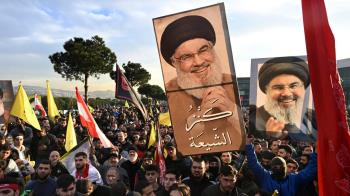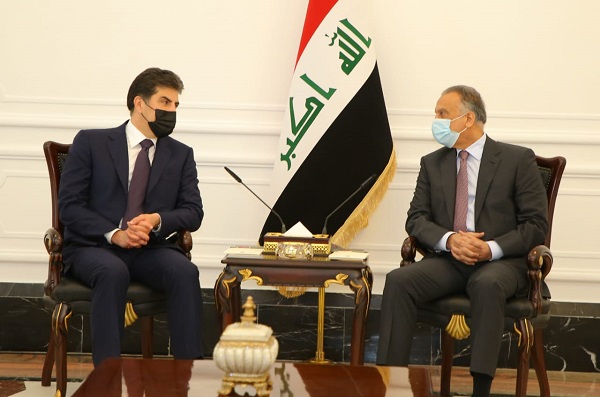Alwaght- On June 20, the Iraqi Kurdistan region’s President Nechirvan Barzani arrived in Baghdad for a two-day visit to talk with the central government officials.
Aside from the discussions Barzani had with the prime minister, the president, and parliament speaker, his meeting with Hadi al-Amiri, the head of the Fatah parliamentary coalition, was important. The eye-catching point at the meeting was that during his discussions with al-Amiri, Barzani expressed his advocacy to the parliament’s bill to expel the foreign forces from the country, passed on January 5.
This comes while over the past few months, the Erbil political leaders brazenly said that they oppose the withdrawal of the American forces from the country, making it clear to Baghdad that they are against the parliamentary resolution.
Now regardless of if Barzani’s comments about the bill are serious are fall under a political game, the question is that what is the most appropriate approach Erbil should take concerning the US expulsion from Iraq amid political and economic predicament the autonomous Kurdish region is living?
Kurds and the US: A history of betrayal and disloyalty
The most serious date of the emergence of the strategic bonds between the US and Kurds was the 1960s and 1970s. In September 1961, Mostafa Barzani, the leader of the Kurdistan Democratic Party (KDP), declared a comprehensive rebellion against the central government led at the time by Abdul Karim Qassem. The outcome was a several-year strenuous conflict with various presidents of Iraq including Abdul Salam Arif, Abdul Rahman Arif, and Ahmed Hassan al-Bakr. It was from the mid-1960s that, by the mediation of the monarchy-ruled, pro-Western Iran, the US initiated its special support for the Kurds.
Since then, the Kurds developed the belief and narration that it was under the US support and alliance with the Americans that they can reach their rights or even establish an independent state. Some sources cite Mostafa Barzani saying “to reach out dreams and wishes, we have to always set our hope on the alliance with the US.”
However, just contrary to the Kurdish optimism, in 1975, the US government announced that it no longer wanted to support the Kurds. Henry Kissinger was cited as saying at that he even did not know who the Kurds were. In the same year of the US betrayal of the Kurds, Baghdad and Tehran signed what is known as Algiers Agreement to settle border disputes. The result was a big defeat to the Iraqi Kurds.
Rise of an autonomous region in northern Iraq and trust in Washington after Saddam rule
As the Kurds renewed their trust in the US, in the late 1980s, during which a heavy armed uprising was underway by the Kurds against the central government and Saddam even bombed with chemical weapons the Kurdish-majority regions including Halabja village and live-buried thousands of civilians, the American administration at the time took no moves to protect the Kurds despite clear evidence of crimes against them. Finally, under the international public opinion pressure, a no-fly zone, which covered the area north of the 36th parallel, was enforced and the United Nations Security Council recognized autonomous region to the Kurds according to 688 resolution.
In the years that followed 2003, the year the US launched an invasion against Iraq and toppled Saddam Hussein, the Kurds broadened their optimism about US-backed formation of an independent Kurdish state, demonstrating that they neither had an understanding of the crucial developments in the Iraqi politics and region in post-Saddam Iraq nor wanted to learn lessons from a decades-long history of American betrayal of them.
The outcome of their betting on the US help to split from Iraq was a big defeat after they organized an independence referendum in 2017. The important point in this referendum was that even the US as their ally refused to throw its weight behind Masoud Barzani, then president of the Kurdish region. The main reason for the US withholding of support was the central government’s show of capabilities and timely arrangements to dissuade the Americans from helping Barzani.
The need to apprehend the time and circumstances
The history of the American-Kurdish relations shows that Washington has never been an actual supporting factor to the Kurds and will not be. Even in the new conditions, if they back the US military stay in Iraq and agree to set up the planned-for four military bases in Erbil and other parts of the autonomous region, the Kurds will find it detrimental to them in short and mid-time.
Currently, the Kurdish region lives a hard financial situation. A dispute with Baghdad that made the latter cut off the budget to Erbil has left the state workers several months unpaid now. The construction projects majorly shut down and a wave of unemployment is hitting the region.
In the middle of this crisis, political differences between the Kurdistan Democratic Party and the Patriotic Union of Kurdistan over the Barzani family’s push to monopolize the power risk returning the autonomous region to dual-administration rule. The only thing in the present conditions the region does not need is widened gaps with the central government especially that the Shiite majority in Baghdad has locked on expelling the US forces from the country.
Meanwhile, two tangible realities can stand as the basis for Kurdish officials’ pragmatic approach to the sensitive US expulsion case. First, according to the parliamentary bill, the Americans have to accept the Iraqi peoples’ demand and move their troops from the Arab country. Second, as the power is shifting in favor of the Axis of Resistance, which covers Iran, Iraq, Lebanon, Syria, and Yemen, and also the international powers like China and Russia, the US is inevitably moving towards expulsion from West Asia region. Also, over the past decade, Washington adopted a “pivot to East” policy in a gradual removal of focus from West Asia.
In such circumstances, the Kurds need to get the right picture of the field developments and learn that it is presence within the framework of the Iraqi national interests that they can realize their interests, not through counting on an overbearing actor coming to the region thousands of kilometers away from home. The Kurdish government should perceive the fact that in the long run, it has no way but cooperation and peaceful co-existence with Iraq’s neighbors. So, it has to step in a path of cooperation with them.



























